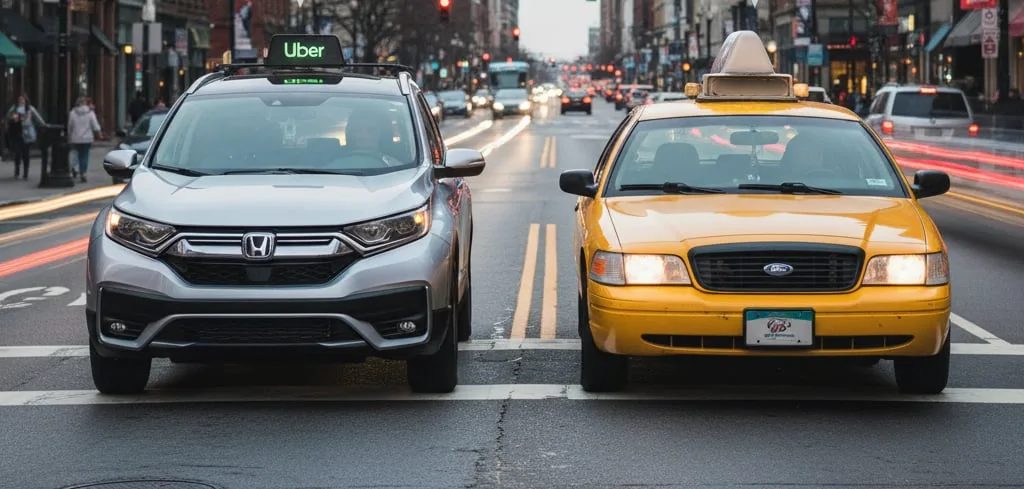In Connecticut’s busy cities—Hartford, New Haven, and Bridgeport—it’s easy to see how rideshare services like Uber and Lyft have transformed transportation. But when an accident happens, who pays? Is it the rideshare company, the driver’s personal auto insurance, or someone else entirely?
Understanding the insurance differences between Uber vs. taxi companies is crucial if you’ve been hurt in a crash while using either service. The rules around rideshare accidents are far more complex than standard car accidents, and knowing your rights can make the difference between getting shortchanged and recovering full compensation.
At Gould Injury Law, our experienced attorneys help victims of rideshare accidents and taxi collisions file insurance claims, establish liability, and secure fair compensation fast.
If you’ve been involved in an Uber, Lyft, or taxi accident, call 888-WIN-FAST today for a free consultation.

Understanding Connecticut Rideshare Insurance Coverage
When a rideshare driver for Uber or Lyft causes an accident, determining which insurance policy applies depends on what stage of the ride they were in. Rideshare companies classify each driver’s coverage based on whether they were logged into the app, waiting for a ride request, or transporting a passenger.
Let’s break down each phase:
1. When the Driver Is Offline
If an Uber driver or Lyft driver isn’t using the app, their personal auto insurance is the only coverage that applies. The rideshare company provides no protection during this period because the trip isn’t considered business-related.
In other words, if a rideshare driver is commuting home or running personal errands and causes a crash, the claim will be handled like any other standard car accident through their private insurance company.
2. When the Driver Is Logged Into the App (But Hasn’t Accepted a Ride)
Once the driver opens the Uber app or Lyft app, the company provides limited liability coverage to protect other motorists in case of an accident.
This coverage typically includes:
- $50,000 per person for bodily injury
- $100,000 per accident for bodily injury to multiple parties
- $25,000 for property damage
However, this protection is secondary to the driver’s personal auto insurance. That means the driver’s own policy must be used first; only if it doesn’t apply (or is insufficient) will the rideshare company’s insurance cover the rest.
3. When the Driver Has Accepted a Ride or Is Transporting a Passenger
Once a driver accepts a trip or has a passenger in the car, Uber and Lyft provide $1 million in liability coverage. This period also includes time spent on route to pick up the passenger.
This coverage can pay for:
- Bodily injuries to passengers or other drivers
- Property damage to vehicles involved
- Certain medical expenses if you’re injured in a crash
If the rideshare driver wasn’t at fault, the other driver’s insurance would apply instead—but Uber or Lyft may still help cover uninsured or underinsured motorists.
This is one of the key advantages of rideshare insurance coverage compared to traditional taxi companies, which often carry lower policy limits.
How Taxi Company Insurance Works in Connecticut
Taxi companies operate under a very different model. Instead of being independent contractors, most taxi drivers are employees or lease drivers covered under the company’s commercial insurance policy.
This means if a taxi driver causes an accident while carrying a passenger, the taxi company is typically directly responsible for covering damages.
Most taxi services in Connecticut must maintain:
- Minimum liability coverage required by state law
- Bodily injury protection for passengers and pedestrians
- Property damage coverage for other vehicles or property
Unlike rideshare companies, which only cover drivers during certain “active” periods, taxi companies provide continuous coverage as long as the driver is working.
However, the downside is that taxi coverage limits can vary significantly depending on the company, and some policies may provide less financial protection than Uber or Lyft’s $1 million coverage.
Determining Liability in Rideshare vs. Taxi Accidents
For Rideshare Accidents
Determining fault in rideshare accidents often requires investigating several layers of responsibility:
- The rideshare driver may have been distracted, fatigued, or speeding.
- The rideshare company might be accused of negligent hiring or failing to conduct proper background checks.
- Other motorists may also share fault in multi-vehicle crashes.
Because rideshare companies classify drivers as independent contractors, they often try to avoid liability by claiming they aren’t directly responsible for the driver’s actions.
That’s where a skilled accident attorney can make all the difference. At Gould Injury Law, we hold every responsible party accountable, ensuring that rideshare companies and insurers don’t push blame unfairly onto victims.
For Taxi Accidents
In taxi accident claims, establishing fault is usually more straightforward.
Because taxi companies directly employ or contract their drivers, they can be held vicariously liable for accidents caused during work-related trips.
If you were a passenger in a taxi crash, you can file a personal injury claim against the taxi service’s insurance policy. You may also have a claim against another at-fault party, such as another driver or a pedestrian who caused the accident.
What to Do After an Uber or Taxi Accident
The steps you take after a crash can affect your insurance claim and your ability to recover compensation.
- Call 911 to report the accident and ensure a police report is filed.
- Seek medical attention immediately, even if you think you’re fine—some injuries appear later.
- Take photos of the accident scene, vehicle damage, and visible injuries.
- Get contact and insurance information from every driver involved.
- Save ride receipts from your Uber or Lyft app or taxi service—they prove the trip details.
- Contact an experienced accident lawyer before speaking to an insurance company or signing documents.
What Insurance Typically Covers After a Rideshare or Taxi Crash
Depending on the circumstances of the accident, you may be entitled to compensation for:
- Medical expenses (hospitalization, surgery, rehab)
- Lost wages from missed work
- Property damage
- Pain and suffering
- Future medical bills or long-term care
The claims process can be complex because multiple insurance policies may overlap. Your lawyer will help determine which insurance applies and how to maximize your payout.
Key Differences Between Uber and Taxi Accident Coverage
| Factor | Uber/Lyft (Rideshare) | Taxi Companies |
| Driver Status | Independent Contractor | Employee or Contractor |
| Primary Coverage | Varies by app status | Continuous while on duty |
| Liability Limits | Up to $1M (active rides) | Varies by company |
| When Coverage Applies | When logged into app or transporting passenger | Anytime the taxi is operating |
| Responsible Party | Driver and sometimes rideshare company | Taxi company directly |
| Claims Process | Through rideshare insurer or app system | Through company’s insurer |
As you can see, coverage depends heavily on whether you were in an Uber or Lyft vehicle or a taxi service.
Why You Need a Connecticut Accident Attorney
Even though rideshare companies advertise strong coverage, they often make it difficult for victims to collect full compensation. They may delay responses, dispute fault, or claim their driver wasn’t “active” when the accident occurred.
At Gould Injury Law, our accident attorneys cut through red tape fast. We:
- Investigate insurance coverage thoroughly
- File all insurance claims correctly and on time
- Identify every at-fault party
- Negotiate aggressively with insurers for fair compensation
- Pursue lawsuits if the rideshare company or taxi service refuses to pay
We move quickly because justice shouldn’t wait. That’s why we’re known across Connecticut as the “Fast Firm.”
Contact Gould Injury Law for a Free Consultation
Whether your crash involved Uber, Lyft, or a taxi, navigating the insurance differences between these services can be overwhelming. You don’t have to figure it out alone.
Call 888-WIN-FAST or contact Gould Injury Law online today for a free consultation.
Our attorneys are ready to help you understand your rights, file your accident claim, and get the compensation you deserve—fast.
